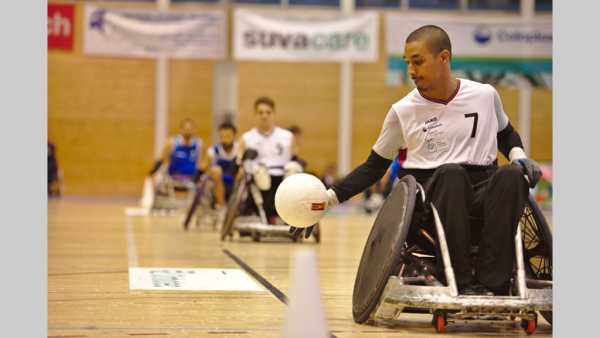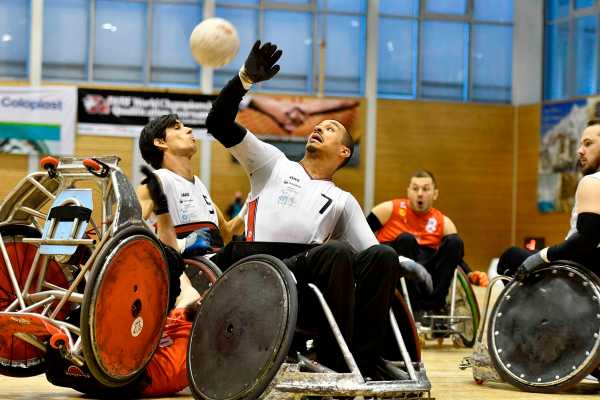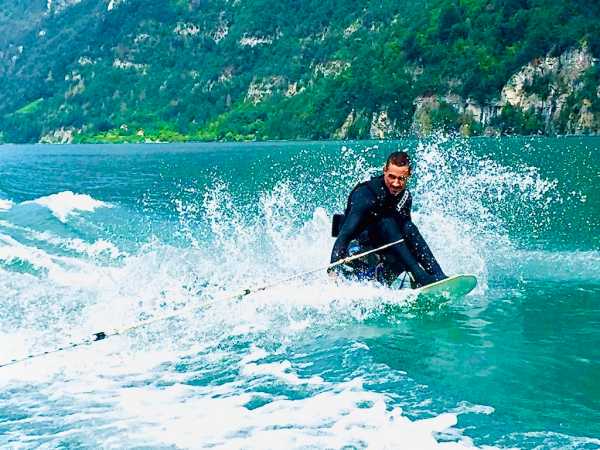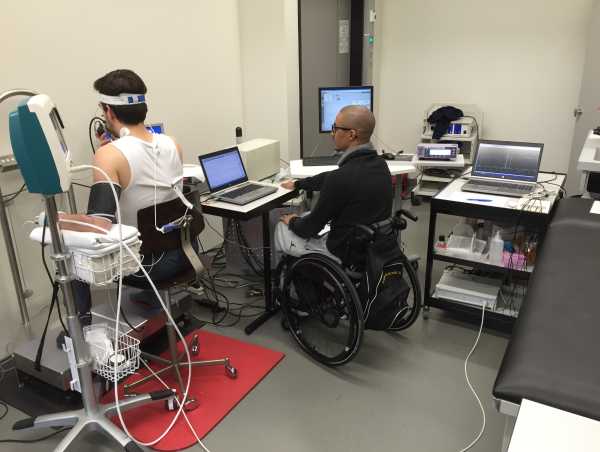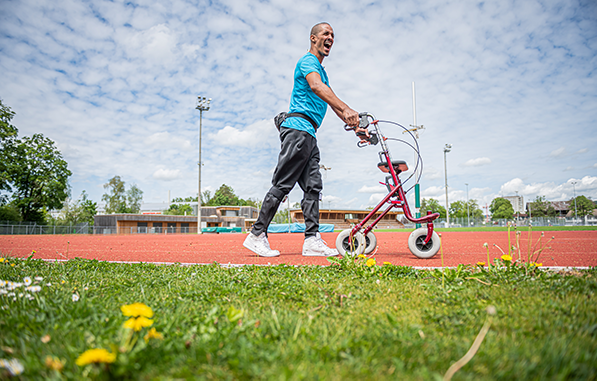David Mzee: "As a youngster, I never thought I’d go to ETH."
- HST Alumni
- Alumni Portraits
ETH alumnus David Mzee loves sport and lives and breathes it. While at university, he survived a major accident, making him a tetraplegic.Thanks to the support of ETH, he graduated with a Bachelor’s in Human Movement Sciences and Sport after a slight delay. On his Master’s course he was best in year, and then added a diploma enabling him to teach in secondary schools. Through the work of a research project, he is now taking his first steps and is giving hope to many paraplegics.
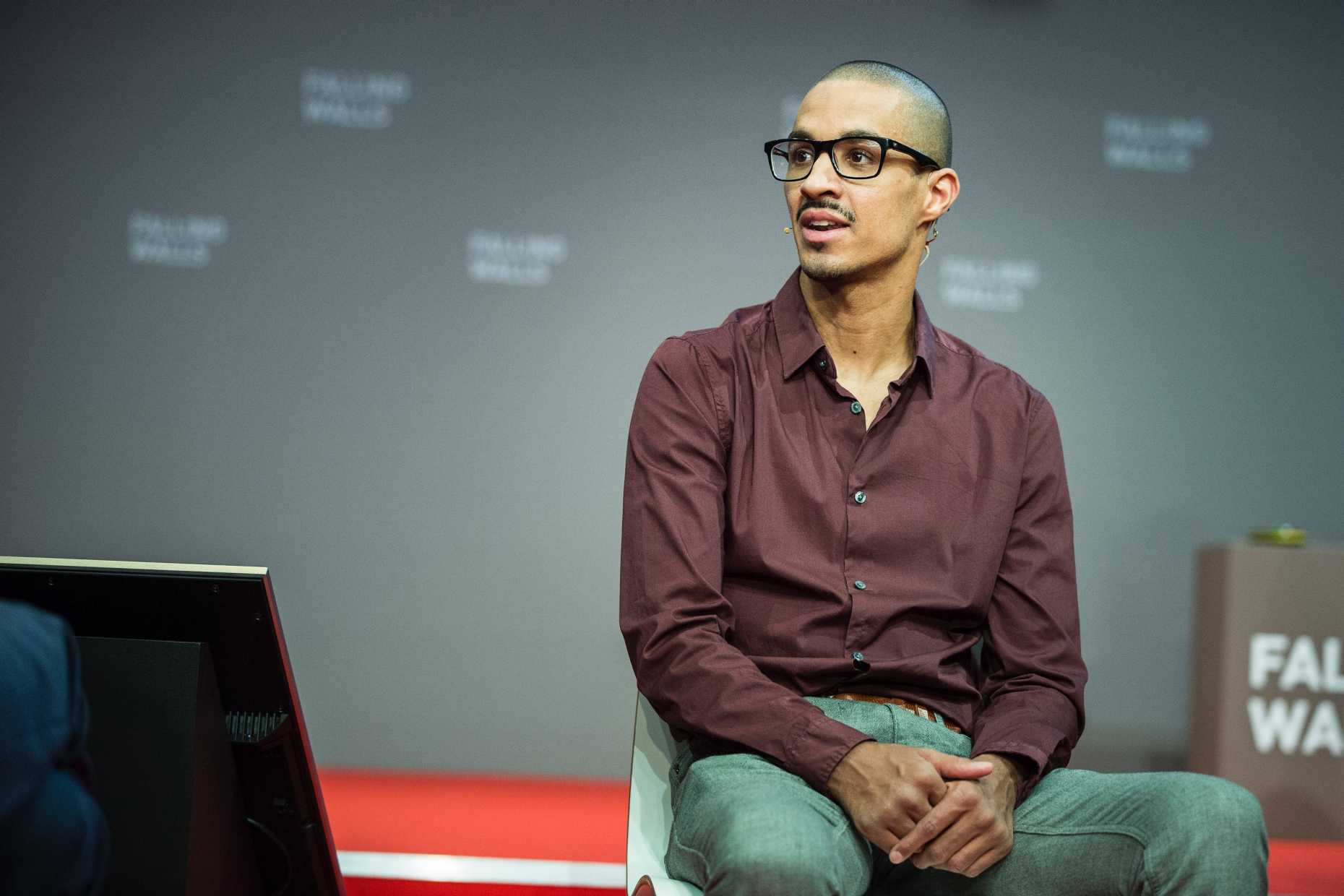
When you were a kid, what did you want to be?
I wanted to play football at professional level. And I still remember because I’ve promised my parents my first million. What I’ll do with any money after that, I’m not sure.
As I kid, you must have been a huge sports fan because you obtained both a Bachelor’s and Master’s in Human Movement Sciences and Sport from ETH. What led you to ETH?
As a youngster, I never thought I’d go to ETH. I found secondary school challenging. And no one in my family had an academic background. So I had a few obstacles to overcome. My passion for sport was certainly the key factor that helped me get there. I was great at sport, I love it and live and breathe it.
I still remember a story my uncle told me. He was a mechanic on a cargo ship transporting foodstuffs. They experienced a problem and he was the only person who could fix it. The goods didn't spoil and he saved the company from huge losses. However, his boss took all the credit because he was better qualified. From that, I learnt that it’s not just about what you are able to do. What you know, your theoretical knowledge, is important too. And I wanted to be prepared on both accounts.
In 2010, you had a serious accident which left you as a tetraplegic. After a break, you returned to your studies. What motivated you?
Once I’ve started something, I like to see it through to the end. I knew that I wanted to continue not only with the theoretical course but I also wanted to get my teaching diploma. At that time, Kurt Murer was head of the Institute of Human Movement Sciences and Sport and he was central to me continuing my studies. He came to see me in hospital and he was incredibly kind. He assured me that he would do everything in his power to allow me to continue at university. He was very motivating.
But my fellow students at ETH were also important. People often came to visit me and I felt supported. That was great. I found it easy to slot back in when I came back. It’s such a great course, I really enjoyed it. And of course my family helped me immensely during this time.
In 2016, you completed your Master’s, were recognised as best in your year and received the Willi-Studer prize. You later obtained a diploma enabling you to teach in secondary schools. How did you find all this?
Well, the Master’s course is theory-based so being in a wheelchair wasn't an issue. I finished my Master’s at the start of the year and received the prize at the end of the same year. It was great to win the Willi-Studer prize; it was the icing on the cake.
Before starting my teaching diploma, I wanted to be sure that I could teach from a wheelchair. Teaching has basically got nothing to do with me being a good sportsman. So I observed everything closely in practical exercises. It felt as if I was seeing so much that other people were missing out on. I noticed if someone was struggling with an exercise. These observations helped me a lot with teaching.
I contacted my former sports teacher from school for some help. I wanted to give a sports lesson on dance, so we worked on a solution together. I was also helped by my former dance instructor. And I gave an hour-long dance class, using verbal images, which lent the lesson a new quality. I also had a go at other courses where the sports teacher would normally provide assistance. It worked and I felt great. Afterwards, we assessed my performance and the feedback was positive.
I was ready to give my all to the teaching diploma. Graduating as a sports teacher was both emotional and joyful: I got top marks in the last exam. I taught unihockey at the Enge secondary school in Zurich. I had two very experienced exam experts. My aim was just to pass so I was delighted when I found out that I had received top marks. It was well worth it: I now teach sport at two vocational schools.
You play in a Swiss national team, admittedly it is not football but wheelchair rugby. You don't see your disability as an obstacle?
Being included as a regular in the national team was super cool. My experience and my training allow me to make a difference in the team. I find that it is fantastic. Switzerland has qualified for the European Championship, which will be held in Poland at the end of June / start of July 2021. I’m really looking forward to that.
Then I wish you all the best in the competition. How do you get to be a regular player?
Our group has a very dark sense of humour. Once, we were discussing how we could attract the next generation of potential players. Someone came up with the idea of flying a banner from the emergency services’ helicopter. Many of us were taken to hospital by the emergency services.
Luckily a lot work has been done in this area. Switzerland has very strict requirements when it comes to safety. We have to wear seat belts in cars, the Swiss National Accident Insurance Fund issues guidelines and implements them. Our neutrality is also a factor: we don’t have any amputee soldiers. Yet despite this, our wheelchair rugby team do well against other countries. But attracting younger players is hard.
Recently, we found someone who is working across Switzerland to recruit the next generation of players. We have a network in the hospitals, which informs young patients about sporting opportunities. We want to improve networking to encourage people in a more targeted manner. No matter what sport you play I think it’s good for you. Sport helps me a lot both in rehabilitation and mentally too.
It borders on madness that our goal is for me to be able to walk without holding on.Dave Mzee
A chip in your spinal cord is allowing you to walk again. What happens next?
It’s hard to say what will happen next. It borders on madness that our goal is for me to be able to walk without holding on. I know exactly what my injury has done to me. The project is running at ETH in Lausanne. I’m always telling them: “You have to try the impossible to make the possible possible.” We’re all working on it. At any rate, I will continue to train and do everything I can to assist the research.
I have been hired as a consultant by the company that has emerged from this work. Thanks to my studies at ETH, I have a huge amount of background knowledge. So I’m the ideal patient they could ever hope for. At least, that’s what they keep telling me.
Do you have any tips for ETH students?
It may sound corny, but it’s important to be grateful. I am incredibly grateful to ETH. Traditionally speaking, I’m not a good pupil. Even as kid, I found it hard to memorise things. But some subjects on the course require you to memorise a huge amount of knowledge. I found that I do well with networked thinking. Over time, I developed clever strategies and mnemonics. Many of my fellow students thought that I overcomplicated things unnecessarily. My strategies saw my grades go up all the time: from average at primary school to best in year at ETH. For example, when I was in the main building, I consciously paused for a moment. I was delighted to be at such a great university which justifiably has such a good reputation.
Secondly, I would advise students to seize any opportunities which present themselves. You are continually being asked to do things when you are at university. It’s not a given that people with a need will contact other people. So if you are asked to do something, make sure you do it. Even if you haven't got any experience. Sometimes you have to go out of your comfort zone. In my experience, this then leads to opportunities which you simply cannot plan for. By accepting, you create a lasting positive impression.
More information about Dave

For more interesting information and details of how to contact Dave, go to external page www.David-Mzee.ch
Swiss national team wins tournament in Poland

Congratulations to the Swiss team, which won the tournament in Poland, elevating them to the top-level league.
In 2022, they will have the opportunity to qualify for the World Cup. We wish them the best of luck!
